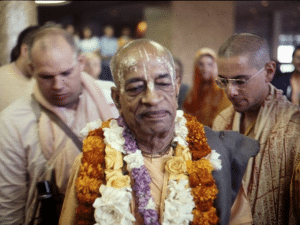This is student. Just see how intelligently the question is put
Prabhupada's class emphasized his presentation of Srimad-Bhagavatam as his most important work. It is not a mere product of his scholarship but a deeply realized penetration into the very essence of life, the problems that haunt all men, and solutions with which to exorcise them.
The verse continued with an inquiry from Parikshit Maharaja as to the value of prayascitta, or atonement for sinful acts. A person knows sinful acts are injurious to him because he sees criminals are punished by the government and rebuked by people in general. He also hears from scripture that one is thrown into hellish conditions in the next life. And yet, still a person commits sinful acts again and again. Therefore, Parikshit asked Sukadeva Gosvami what the value of such atonement is.
After condemning the so-called scientists and philosophers who think life is merely chemicals, and after explaining the Bhagavatam's analysis that life is spirit, Prabhupada pointed out to his attentive audience that Parikshit Maharaja, the emperor of the world, submissively inquired from Sukadeva Gosvami. "Because," Prabhupada said, "he is the disciple and son of Vyasadeva. So this is parampara. One should learn from the right person, that is perfect knowledge. We are sticking to the Krishna consciousness movement to receive perfect knowledge. If we change, if we become so rascal that 'What has been spoken in Vedic literature, there is beyond, something,' then we are rascal. There is no beyond. This is perfect knowledge."
He explained very clearly the proper way to receive this perfect knowledge. "Our process of Vedic knowledge is how to surrender, not that I hear and reject it. That is not the way. That is another rascaldom. ... Surrender means you first of all be convinced that 'The person whom I am going to accept as guru, whether he actually can give me the knowledge?' That is wanted. Therefore, before taking guru, the system is, for one year the prospective disciple should hear from the person and then decide. And similarly, the guru also should see a person is actually submissive or not. That is Vaishnava injunction, Hari-bhakti-vilasa."
Prabhupada defined submission. "Intelligently serve. It is not that he is checking the guru, 'How my guru is learned?' No. The submission is there. But when the guru says something he may not understand, that concession is there, pariprasnena, you inquire."
Therefore he said Parikshit's question was very intelligent because as a king he knew practically that criminals repeatedly commit crimes even after going to jail, and medical patients repeatedly become diseased even after undergoing troublesome and painful treatment, because neither can stop their bad habits. "This is student. Just see how intelligently the question is put. Sukadeva Gosvami said that for any sinful action, atonement, one has to atone. So he immediately catches this word, this intelligent disciple, that 'What is the value of this atonement? If he cannot correct himself to commit the sinful activity, then what is the value of such atonement?' This is very nice question, we shall discuss tomorrow."
Reference: Transcendental Diary Volume 2 by Hari Sauri Dasa
Recently Added
Trending Today
